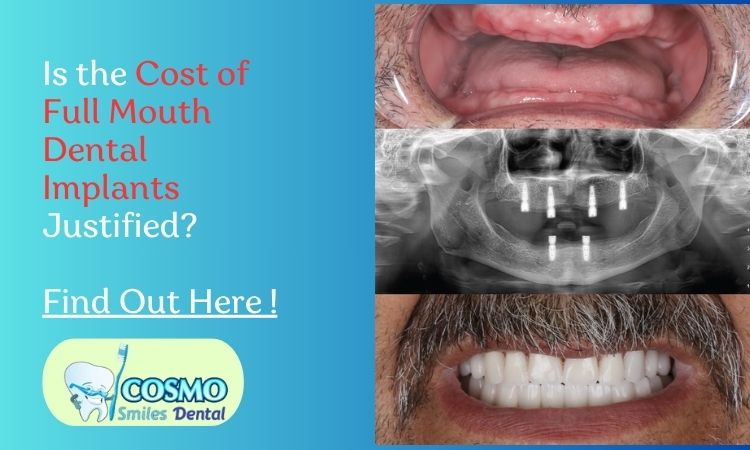When faced with tooth loss, many individuals seek a solution that doesn’t just restore their smile but also improves their quality of life. Among the most advanced options available, full mouth dental implants stand out for their durability and natural function. For anyone considering this treatment, one critical question usually arises first: What does the full mouth dental implants cost, and is the investment truly worth it?
This blog will provide an in-depth look at the cost of full mouth dental implants, the factors influencing the price, and why this procedure might be one of the best decisions you make for your oral health.
What Are Full Mouth Dental Implants?
Full mouth dental implants consist of a complete set of artificial teeth secured using dental implants embedded in the jawbone. Unlike removable dentures, these implants are permanent and feel just like natural teeth. The process typically includes placing four to six implants in each jawbone, which act as the foundation for custom-made prosthetic arches.
Benefits of Full Mouth Dental Implants:
- Permanent Solution: Eliminates the hassle of adhesives or removable prosthetics.
- Natural Appearance: Customized to create a perfect, natural-looking smile.
- Improved Functionality: Chew, speak, and smile without restrictions.
- Prevents Bone Loss: Fosters jawbone stimulation, which helps to mitigate the risk of atrophy.
Though the cost may seem steep, the benefits of full mouth dental implants often far outweigh the initial expense, especially for those prioritizing long-term solutions.
What Influences the Full Mouth Dental Implants Cost?
Understanding the expense of full mouth dental implants requires breaking down the various factors that contribute to the overall price. Here are the main elements affecting the cost:
1. Initial Examination and Diagnostics
The process starts with a thorough evaluation, which includes X-rays, 3D imaging, and sometimes CT scans. These diagnostics ensure precise planning for implant placement, which plays a significant role in the success of the procedure. Generally, these initial actions are part of the total expenditure.
2. Preparatory Procedures
Not all patients are immediately ready for implants. A few may require additional interventions, including:
- Bone Grafting: For patients with insufficient jawbone density, a bone graft may be needed to create a stable base.
- Tooth Extractions: Teeth that are in poor condition or decayed could require removal before placement.
These preparatory treatments can add to the overall budget.
3. The Number of Implants
Most full-mouth solutions require between four and six implants per jaw. Advanced techniques, like the All-on-4 method, can reduce the number of implants needed. Fewer implants may decrease the procedure’s cost while still delivering excellent results.
4. Type of Prosthetic Teeth
The material of the prosthetics also has a significant impact. Options include:
- Acrylic (lower cost, but less durable)
- Porcelain or Zirconia (costs more but offers unparalleled longevity and a natural appearance)
5. Technology and Expertise
Clinics that utilize advanced technology, like virtual implant planning and guided placement, often charge more because these innovations optimize success rates. Additionally, working with highly skilled professionals ensures a better outcome and reflects their expertise in the pricing.
6. Location of the Procedure
Costs for dental implants depend on your geographical location. Dental implant costs vary depending on where you live. Metropolitan areas with higher living expenses tend to have higher prices for dental care.
Average Cost of Full Mouth Dental Implants
The total full mouth dental implants cost can range from $20,000 to $50,000 per arch, depending on the factors mentioned above. While the initial expense can seem overwhelming, keep in mind that this is a long-term investment. With proper care, implants may last 20 years or more, minimizing lifetime costs compared to other dental solutions.
Are Full Mouth Dental Implants Worth the Investment?
Most people would answer this question with a strong yes. Here’s why:
Improvement in Quality of Life
Unlike traditional dentures, implants feel and function like natural teeth. They allow you to eat your favorite foods, laugh freely, and speak without worry that your teeth might shift or fall out.
Long-Term Cost Efficiency
While dentures may come cheaper upfront, their recurring costs for replacements, adjustments, adhesives, and cleaning solutions can add up over time. Implants don’t require these recurring expenses.
Preservation of Oral Health
Impalatable results of missing teeth include bone deterioration, gum disease, and a compromised facial structure. Implants avert these issues by fusing directly into your jawbone.
Confidence Restoration
For many patients, one of the greatest returns on investment is the renewed confidence from effortlessly flashing a beautiful, natural-looking smile.
Discover Your Smile Transformation
Getting full mouth dental implants is about more than replacing teeth – it’s about reclaiming your confidence and improving your overall quality of life. To ensure the best outcome, consult with skilled professionals. At Cosmo Smiles Dental, our experienced team combines advanced technology with compassionate care to guide you confidently through your smile restoration.
Your confident smile starts with a single step — call Cosmo Smiles Dental at (571) 210-4747 or book an appointment and begin your journey to a radiant, lasting smile today!
FAQs About Full Mouth Dental Implants Cost
1. Are full mouth dental implants covered by insurance?
While most insurance policies don’t cover the full cost of implants, they may partially cover exams, X-rays, or pre-treatments. It’s best to check with your provider.
2. Can dental implants fail?
Even though it’s rare, implants might fail if oral hygiene is neglected. Smoking or pre-existing conditions like uncontrolled diabetes can also impact success rates.
3. What are financing options for dental implants?
Many clinics, including Cosmo Smiles Dental, offer affordable financing plans that split the cost into manageable payments.
4. Do implants require special care?
Not at all. To keep your implants in top condition for years, brush and floss regularly and visit the dentist for check-ups.
5. Can everyone get full mouth dental implants?
Most patients are eligible for implants, but those with severe oral health issues or health conditions like osteoporosis may require additional treatments.
